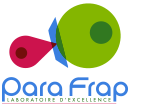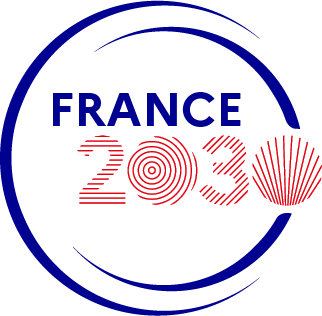-
PARAFRAP
- Qui sommes-nous
- Objectifs du Labex
- Laboratoires de recherches
- Coordinateurs
- Collaborateurs industriels
- Tutelles et soutiens
- GOUVERNANCE
- Organisation
- Comité de pilotage
- Comité exécutif
- Conseil scientifique international
- Comité Institutionnel
- FORMATION
- CONFERENCES
- THÉMATIQUES
- Exploitation des données post génomiques
- Mécanisme de la pathogénie
- Biologie Cellulaire et Moléculaire
- Nouvelles stratégies d'interventions thérapeutiques
- Plateformes
- VALORISATION
-
PARAFRAP
- Qui sommes-nous
- Objectifs du Labex
- Laboratoires de recherches
- Coordinateurs
- Collaborateurs industriels
- Tutelles et soutiens
- GOUVERNANCE
- Organisation
- Comité de pilotage
- Comité exécutif
- Conseil scientifique international
- Comité Institutionnel
- FORMATION

Gerald SPAETH
Information

Departement of Parasite and Insect vectors 
Molecular Parasitology and Signaling 
Bordeaux 
0000-0002-0256-2029 
Cette adresse e-mail est protégée contre les robots spammeurs. Vous devez activer le JavaScript pour la visualiser. 
https://research.pasteur.fr/en/team/molecular-parasitology-and-signaling/ Scientific interests and projects
The unit ‘Molecular Parasitolgy and Signaling’ conducts multidisciplinary and internationally highly visible research on Leishmania/macrophage interaction and co-evolution. Our program analyses Leishmania and macrophage regulatory pathways implicated in intracellular parasite development and subversion of host cell functions that qualify as novel drug targets. We will pursue three main axes as part of the ParFrap consortium:
Axis 1 investigates mechanisms of Leishmania differentiation and evolutionary adaptation by conducting systems level and comparative genomics analyses of hamster-derived parasites and clinical isolates with the aim to identify genetic loci that are linked to Leishmania fitness gain in culture and in infected animals;
Axis 2 analyses the signalling role of the Leishmania ecto-kinase CK1.2 and its role in subversion of host cell immune signalling, with the aim to target its exosomal release for anti-leishmanial therapy;
Axis 3 studies mechanisms of Leishmania host subversion using immunological, pharmacological and systems-level investigations, with the aims to (i) discover host-directed, anti-leishmanial hits and (ii) study the impact of intracellular Leishmania infection on macrophage epigenetic regulation, phenotype and functions.
Together these three axes provide important added value to the main ParaFrap scientific work packages, including WP1 on post genomic data exploration (Axes 1 – 3), WP2 on mechanisms of pathogenesis and anti-parasite immunity (Axes 2 and 3), WP3 on parasite molecular and cellular biology (Axes 1 and 3), and WP4 on development of new intervention strategies against parasitic pathogens (Axes 2 and 3).
Top 5 publications of the last 5 years 1. Bussotti G et al. and Späth GF. Leishmania Genome Dynamics during Environmental Adaptation Reveal Strain-Specific Differences in Gene CNV, Karyotype Instability, and Telomeric Amplification. MBio. 2018 doi: 10.1128/mBio.01399-18
2. Prieto Barja P et al. and Späth GF. Haplotype selection as an adaptive mechanism in the protozoan pathogen Leishmania donovani. Nature Ecol Evol, 2017. doi: 10.1038/s41559-017-0361-x
3. Drini S et al., and Späth GF. Species- and Strain-Specific Adaptation of the HSP70 Super Family in Pathogenic Trypanosomatids. Genome Biol Evol. 2016. 10.1093/gbe/evw140
4. Cayla M et al. and Späth GF. Transgenic analysis of the Leishmania MAP kinase MPK10 reveals an auto-inhibitory mechanism crucial for stage-regulated activity and parasite viability. PLoS Path. 2014 10.1371/journal.ppat.1004347
5. Dacher M et al. and Späth GF. Probing druggability and biological function of essential proteins in Leishmania combining facilitated null mutant and plasmid shuffle analyses. Mol Microbiol. 2014 10.1111/mmi.12648
mardi 20 janvier 2026Call for Applications: New Junior Research Groups at Institut Pasteur
Call for Applications: New Junior Research Groups at Institut Pasteur The Institut Pasteur has launched an international call to recruit new junior group leaders.This is a unique opportunity for high-potential scientists to...
lundi 12 janvier 2026Ingénieur·e d’étude / Research Engineer – Mosquito Immunity (IBMC, Strasbourg)
JOB : Ingénieur·e d’étude / Research Engineer – Mosquito Immunity (IBMC, Strasbourg) 🇫🇷 Le laboratoire Mosquito Immune Responses recrute un·e ingénieur·e d’étude à l’IBMC (Strasbourg). La personne recrutée sera en...
mardi 6 janvier 2026Applications Open for the Biology of Parasitism Course 2026
Applications are now open for the 2026 Biology of Parasitism (BoP) course, taking place June 12–July 23, 2026 at the Marine Biological Laboratory in Woods Hole, MA.This intensive 6-week program offers PhD students and postdocs advanced training in...
jeudi 27 novembre 2025Research Assistant/Associate Position | Molecular Parasitology | Newcastle University
Newcastle University offers a full-time, fixed-term position (3 years) for a Research Assistant or Research Associate in Molecular Parasitology — funded by the Medical Research Council (MRC). About the Opportunity Location:...
jeudi 13 novembre 2025PhD Opportunity | African Trypanosomes | University of York
Multidisciplinary PhD opportunity in the fields of infectious diseases, gene regulations and molecular signalisation. Fully Funded 4-Year PhD at the University of York A fully funded PhD opportunity is available at the...
mardi 14 octobre 2025Recap of the EMBO Workshop 2025
The EMBO Workshop 2025 “Host–Parasite Relationship: From Mechanisms to Control Strategies”, took place from October 5–8, 2025, on the beautiful Île des Embiez (France). Organized within the framework of the LabEx ParaFrap and...
jeudi 31 juillet 2025PostDoc l Toxoplasma l Montpellier, FR
Postdoc (M/F) in molecular and biochemical parasitology (Toxoplasma gondii) A 24-month post-doctoral position starting on January 2026 and funded by the French National Research Agency (ANR) is available in the in the...
lundi 9 juin 2025PostDoc l Trypanosoma l Bordeaux, FR
Postdoc (M/F) Molecular and cell biology in Trypanosoma brucei A 24-month post-doctoral position starting on November 1st 2025 (or before) and funded by the French National Research Agency (ANR) is available in the...
mercredi 4 juin 2025PostDoc l Plasmodium l Montpellier, FR
Postdoc (M/F) in molecular biology in P. falciparum Workplace: MONTPELLIER Contract Period: 24 months Expected date of employment: 1 October 2025 Proportion of work: Full Time Remuneration: Starting from...
vendredi 25 avril 2025EMBO Workshop Host Parasite 2025 - Registration
Registration is now open for the EMBO Workshop "Host-Parasite Relationship: From Mechanisms to Control Strategies," supported by...
Bluesky feed
PROGRAMME DE FORMATION FR
Programme Doctoral InternationalProgramme Post-doctoralACTUALITÉS
© 2023. Tous droits réservés by MLCOM
Notre site LabEx ParaFrap utilise des cookies pour réaliser des statistiques de visites, partager des contenus sur les réseaux sociaux et améliorer votre expérience. En refusant les cookies, certains services seront amenés à ne pas fonctionner correctement. Nous conservons votre choix pendant 30 jours. Vous pouvez changer d'avis en cliquant sur le bouton 'Cookies' en bas à gauche de chaque page de notre site. En savoir plus
Paramétrages de cookies
×Cookies fonctionnels
Ce site utilise des cookies pour assurer son bon fonctionnement et ne peuvent pas être désactivés de nos systèmes. Nous ne les utilisons pas à des fins publicitaires. Si ces cookies sont bloqués, certaines parties du site ne pourront pas fonctionner.
Mesure d'audience
Ce site utilise des cookies de mesure et d’analyse d’audience, tels que Google Analytics et Google Ads, afin d’évaluer et d’améliorer notre site internet.
- Google Analytics
- Google Ads
Contenus interactifs
Ce site utilise des composants tiers, tels que NotAllowedScript6977d00fb3ffdReCAPTCHA, Google NotAllowedScript6977d00fb3ca5Maps, MailChimp ou Calameo, qui peuvent déposer des cookies sur votre machine. Si vous décider de bloquer un composant, le contenu ne s’affichera pas
- Google Maps
Pour en savoir plus, cliquez sur le lien.
Voir le site officiel - Calameo
Pour en savoir plus, cliquez sur le lien.
Voir le site officiel - reCaptcha V2
Pour en savoir plus, cliquez sur le lien.
Voir le site officiel - reCaptcha V3
Pour en savoir plus, cliquez sur le lien.
Voir le site officiel
Réseaux sociaux/Vidéos
Des plug-ins de réseaux sociaux et de vidéos, qui exploitent des cookies, sont présents sur ce site web. Ils permettent d’améliorer la convivialité et la promotion du site grâce à différentes interactions sociales.
- Twitter
Pour en savoir plus, cliquez sur le lien.
Voir le site officiel
Session
Veuillez vous connecter pour voir vos activités!Autres cookies
Ce site web utilise un certain nombre de cookies pour gérer, par exemple, les sessions utilisateurs.




